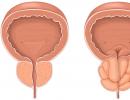Low blood pressure: causes and consequences, symptoms, treatment
Compared to hypertension, low blood pressure is considered less dangerous. Low blood pressure is accompanied by chronic fatigue, weakness, a person constantly wants to sleep, there are no vital forces. A drop in blood pressure due to impaired blood supply to organs and tissues can lead to serious pathologies in any organ systems.
Causes of pathology
If the patient often suffers from pressure drops, you should consult a doctor for examination and identification of the disease that caused this ailment.
On average, the normal blood pressure for a person is considered to be 120/70 mm. rt. Art. If the pressure readings are 100/60 mm. rt. Art. or lower, the person's condition is called hypotension, and people suffering from low blood pressure are called hypotensive. It is important to identify and eliminate the cause of the disease in a timely manner in order to avoid its negative consequences.
Enter your pressure
Move the sliders
Reductions in blood volume
 Dehydration leads to a decrease in blood pressure.
Dehydration leads to a decrease in blood pressure. The pressure drops due to a significant decrease in the total blood volume, which can occur as a result of heavy bleeding (with injuries, heavy menstruation, bleeding with hemorrhoids, etc.). Blood becomes less with dehydration if:
- the patient has diarrhea or vomiting;
- a person takes diuretics incorrectly;
- the patient drinks too little.
Heart pathologies
The causes of low blood pressure in men and women may be in diseases of the cardiovascular system. A decrease in the contractile function of the heart muscle, resulting in a decrease in blood pressure, is observed in pathologies such as:
- myocardial infarction;
- cardiac tamponade;
- atrial or ventricular fibrillation.
Vegetative-vascular dystonia
Decreased blood pressure is often diagnosed as a derivative of VVD. This disease is characterized by discoordination of the vascular center in the medulla oblongata. As a result, the vascular bed is not compressed enough to maintain normal blood pressure. People with this diagnosis do not have enough strength to live the way they would like, they are sensitive to weather changes.
Atherosclerosis
This cause of low blood pressure is found in elderly patients. As a result of atherosclerosis, blood vessels become calcified, lose their tone and the ability to quickly contract and relax. Also, with this disease, the blood supply to the brain and its vascular center in particular is disturbed. As a result, blood pressure is reduced. In this case, you need to treat the cause of poor health, and not try to cope with the symptoms.
Shock or collapse
Signs of low blood pressure in humans are found during intoxication, heat stroke, any kind of shock (pain, anaphylactic). In any of these conditions, blood deposits (accumulates) in the vessels of the peritoneum, and the periphery, such as the limbs or the brain, is bled. As a result, the patient's blood pressure drops, and health worsens.
In women, blood pressure may decrease during pregnancy.
 Hormonal imbalance, can provoke hypotension.
Hormonal imbalance, can provoke hypotension. Blood pressure drops if the patient develops adrenal insufficiency or hypothyroidism. In the first case, the body develops a lack of aldosterone, which is produced by the adrenal cortex. Because of this, sodium levels decrease and, as a result, dehydration occurs. In the case of a deficiency of hormones synthesized by the thyroid gland, the tone of blood vessels worsens, the rate of contraction of the heart muscle decreases, which negatively affects the level of blood pressure.
Blockage of the pulmonary artery
In case of blockage of a large vessel of the lung by a thrombus, which most often enters this area from the pelvis or legs, acute hypotension occurs. At the same time, the heartbeat becomes more frequent, dizziness, tinnitus occur. Oxygen starvation of the brain occurs, a stroke is possible. The patient's blood pressure decreases, fainting or coma is possible.
What other reasons could there be?
The causes of low blood pressure may be:
- pregnancy (due to an increase in the circulatory system);
- antihypertensive drugs;
- oncological disease;
- anemia;
- starvation, unbalanced diet.
Symptoms of low blood pressure
Symptoms of low blood pressure in all hypotension are individual. If in one patient the main complaint is a headache, then in another hypotension is manifested by irritability, mood swings, dizziness. People with low blood pressure are worried about weakness, general malaise, lethargy, constant sleepiness. As a result, the patient cannot live a full life.
From the side of the skin
Hypotensives have excessive sweating, the skin is always pale and cold. As a result of insufficient blood supply to the tissues under the eyes, dark circles appear. In the case of acute pathology, the fingers and the nasolabial triangle turn blue. If blood pressure has dropped due to a malfunction of the thyroid gland, the skin becomes dry, swelling occurs, nails and hair become brittle.
If a person has a sharp drop in pressure, you should give him salty food and drink water.
From the gastrointestinal tract
 Internal bleeding with a stomach ulcer lowers blood pressure.
Internal bleeding with a stomach ulcer lowers blood pressure. Internal bleeding in the gastrointestinal tract in the presence of a peptic ulcer is capable of lowering the pressure. In this case, the patient complains of abdominal pain, heartburn, belching, diarrhea / constipation. In case of violation of the thyroid gland, the acidity of the gastric juice and its saturation with enzymes decrease, as a result of which the digestion process is disturbed, dyspepsia develops.
CNS reaction
If a person's low blood pressure is due to shock or collapse, the patient's consciousness is clouded or absent. With pathologies of the endocrine system that led to low blood pressure, lethargy appears, memory decreases. A hypotonic person often feels unwell, complains of chronic fatigue, drowsiness. Even in the morning a person is tired, a feeling of weakness does not leave him.
Respiratory system
Reduced pressure provokes oxygen starvation of all tissues of the body. Signs of low pressure from the respiratory organs are called compensatory shortness of breath. This phenomenon is especially noticeable during physical activity. Thus, the body tries to improve the blood supply to the tissues. The manifestation of hypotension, formed with PE or other serious lung damage, is wheezing and pink sputum.
From the side of the heart and blood vessels
The symptoms of low blood pressure are not the same as those of high blood pressure, because in the case of hypotension, the heart may not respond to it in any way. During a myocardial infarction or stroke, a weak heartbeat and low blood pressure are detected. Depending on the characteristics of the body and associated pathologies, excessive tension and acceleration of contractions of the heart muscle along with reduced blood pressure are possible.
Adrenal insufficiency
If low blood pressure values are a derivative of adrenal insufficiency, then the symptoms will be as follows:
- With Addison's disease, muscle tone decreases, the patient suffers from increased fatigue. The rate of contraction of the heart muscle increases. Pigment spots appear on the skin, blood sugar levels decrease. Attention is scattered, memory deteriorates. There is a disorder of the stool, nausea, vomiting in parallel with pain in the abdomen.
- With secondary insufficiency, the symptoms are the same, but skin pigmentation is absent.
- In an adyssonian crisis, blood pressure drops rapidly, and vomiting and diarrhea, which cannot be eliminated, lead to a decrease in the level of fluid in the body. General excitement is replaced by inhibition.
Hypotension in women
 The fight against excess weight can lead to depletion of the body and due to hypotension.
The fight against excess weight can lead to depletion of the body and due to hypotension. The causes of low blood pressure in women have their own characteristics:
- The fight against excess weight, popular among women, leads to the fact that the patient crosses a certain limit and brings herself to exhaustion with all kinds of diets, provoking a decrease in blood pressure.
- Hypotension develops against the background of anemia associated with heavy menstruation, uterine fibroids.
- During pregnancy, the pressure drops due to a hormonal surge. Due to the increase in the abdomen, the veins are affected, cardiac output decreases and blood pressure falls.
Hereditary hypotension can manifest itself in a person from an early age.






